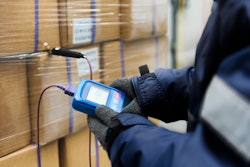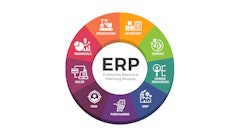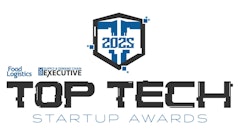
Elysse Blank, director, supply chain, West Monroe, was named a recipient of the 2025 Women in Supply Chain award, presented by Food Logistics and Supply & Demand Chain Executive, and sponsored by Let’s Talk Supply Chain, in the Rising Stars category.
As director in West Monroe’s supply chain management (SCM) practice, Blank consults with and leads Fortune 1000 and upper mid-market clients across industries in complex supply chain transformation initiatives.
She joined West Monroe in July 2022, bringing with her a wealth of experience and expertise in the automotive sector and across all supply chain processes. Since joining West Monroe, Blank has helped numerous clients navigate major supply chain transformations. Over the past 2.5 years, she has built and led a new West Monroe account in the tire distribution sector, guiding the client through a full supply chain transformation, network optimization, and ERP selection and implementation, resulting in more than $100 million in working capital reduction and an $80 million improvement in EBITDA. She also led a pro bono project supporting a minority-owned business in Chicago, where her team developed a financial and operational model to simulate costs and establish sustainable pricing strategies.
Prior to joining West Monroe, Blank was a supply chain program manager at Tesla, responsible for tracking part sourcing and launch readiness for various core technologies. She also played a key role in establishing a new program management position within the Core Technologies Supply Chain team and optimized existing processes for greater efficiency. Prior to her time at Tesla, Blank spent nearly seven years at Webasto Roof Systems, where she achieved five promotions. She also served as lead program manager for the innovative roof system for the reimagined Ford Bronco, where she guided a cross-functional global team of 100-plus colleagues from R&D, quality, operations, and other functions. Together, they launched the product under an aggressive schedule, despite challenges posed by the COVID-19 pandemic. She also led purchasing and supplier quality teams, overseeing cost benchmarking, value engineering, and special projects, and played a key role in Webasto’s North American turnaround, helping deliver a $30 million bill of material reduction.
Blank's extensive background also includes roles in systems and process reporting, where she led SAP system implementations and strategic process planning that resulted in substantial cost savings.
Marina Mayer, editor-in-chief of Food Logistics and Supply & Demand Chain Executive and co-founder of the Women in Supply Chain Forum, sat down with Blank to detail West Monroe’s pro bono project, challenges faced in the industry and what it takes to lead complex supply chain transformation initiatives for Fortune 1000 companies.
Food Logistics and Supply & Demand Chain Executive: Let's first talk about you. Tell us about yourself and your journey in how you got to this current stage in your career.
Elysse Blank: My career journey has been far from traditional. With a degree in finance and economics from Michigan State University, I initially planned to pursue a career in investment banking. After graduation, I began working in finance in Chicago, but life had other plans. I found myself back in Michigan, unexpectedly stepping into the automotive industry—a familial career path I never thought I would follow.
What I assumed would be a short-term stop turned into the cornerstone of my career. I spent nearly eight years at Webasto Roof Systems, advancing through a variety of positions and leading major projects, such as the launch of the Ford Bronco Hard Top. During my time in automotive, I often found myself in consulting-like roles—driving turnarounds, collaborating with external consultants on transformation initiatives, and optimizing processes.
When I was ready for a new challenge, consulting felt like a natural next step. It allowed me to apply my operational expertise while broadening my experience beyond the automotive sector. Since joining West Monroe in July 2022, I have grown and acclimated quickly. My industry background has proven invaluable, as it enables me to quickly connect with clients, understand their challenges, and deliver meaningful results.
Food Logistics and Supply & Demand Chain Executive: Walk me through some of the challenges you personally have faced in the industry, and what you did to turn those challenges into opportunities.
Blank: Early in my career, I navigated the challenges of being a young woman in a traditionally male-dominated industry. Being promoted to management in my mid-twenties meant stepping into rooms filled with seasoned leaders whose experience far exceeded my own. It wasn’t unusual to sense the unspoken question of, "Who is she, and why is she here?".
There was one moment in particular that really shaped my perspective. While traveling through an airport, I met someone working in the sports contract management field I had once aspired to join. As we discussed career paths, he casually remarked, "Oh, we’d love to hire someone like you. We send you in to warm up the client before we go in and close the deal." That comment was everything – I was determined to be the one closing the deal.
I learned to flip that script. Rather than trying to justify my seat at the table, I focused on demonstrating my value through the quality of my work and expertise. By the end of any meeting, it was clear why I was in that room. This mindset has served me well throughout my career, whether I was building credibility in automotive or establishing new client relationships in consulting.
Food Logistics and Supply & Demand Chain Executive: Over the past 2.5 years, you built and led a new West Monroe account in the tire distribution sector. What does this entail?
Blank: Just a few months into my career at West Monroe, I had the opportunity to lead a business development effort, competing against 10 other firms for a supply chain transformation project. The client was grappling with post-pandemic challenges like stranded inventory, fulfillment issues, and supply chain disruptions. We won the work late in December, landed a team on site the first week of January, and what began as an eight-week assessment evolved into a 2.5-year partnership spanning supply chain, finance, sales, distribution, and enterprise systems.
The key to success was building trust and showing we could tackle any challenge, big or small. I believe there's no substitute for physical presence in building business relationships. The conversations outside of meetings matter. Someone might not reach out about a new project just because they sat on a call with you, but they will because you stopped by their office to chat. Those connections turn into new opportunities and deeper partnerships, and ultimately helped us build our repeatable Supply Chain Optimization offering.
Food Logistics and Supply & Demand Chain Executive: You also led a pro bono project supporting a minority-owned business in Chicago. What was involved with this project? And why do a pro bono project?
Blank: We worked with a Chicago-based startup founded by two entrepreneurs who needed help scaling their business from a vision to an enterprise. Our team built an operating and financial model to support sustainable growth, tackling challenges like production planning, cross-state regulatory compliance, inventory management, and transitioning from batch to mass production. We also created financial projections to map out cash flow, investment needs, and profitability timelines.
Why pro bono work? We live and work in Chicago, and we want to support our local community. Many entrepreneurs start businesses without formal business or finance backgrounds, and that shouldn't be prohibitive to achieving their dreams. Minority-owned businesses specifically face greater barriers to entry, including limited access to funding and higher standards to qualify for it. By providing a framework for growth, we help them unlock opportunities to bring their vision to life – a win for both them and the community.
Food Logistics and Supply & Demand Chain Executive: What are your Top 3 predictions/trends for supply chain and logistics come 2026?
Blank:
1. Supply chain resilience and risk management will continue to dominate strategic priorities. The aftershocks of the pandemic, ongoing regulatory changes, and shifting global trade patterns continue to reshape supply chain strategies. Companies are toggling between global and local supply models, often reversing course as conditions change. The focus now is on building strong risk management capabilities – understanding where your suppliers are, what they are doing, and the liabilities tied to their actions, not just your own operations.
2. AI is no longer just a buzzword or a distant promise – it’s becoming a standard tool for driving smarter decisions. Machine learning applications are leveraging massive data sets to enable better forecasting, optimized inventory levels, and predictive analytics. These capabilities are quickly evolving into essential competitive advantages.
3. Domestic manufacturing and infrastructure investment is becoming critical. In the U.S., there’s growing attention on modernizing infrastructure, like ports, to improve efficiency. However, the bigger challenge is the skilled labor shortage. Rebuilding domestic manufacturing and distribution capabilities requires truck drivers, maintenance engineers, tooling specialists, and other skilled trades workers. This calls for a cultural shift—investing in apprenticeships, promoting skilled trades, and showcasing these careers as viable, well-compensated alternatives to traditional college paths.
CLICK HERE to meet all of the winners from this year's Women in Supply Chain award.




















